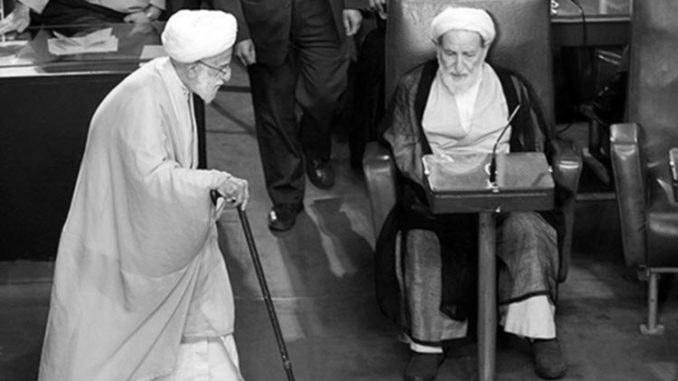
As factional feud among Iranian regime officials escalates once again, the head of the influential Assembly of Experts, mullah Ahmad Jannati, called upon president Hassan Rouhani to apologize to the people of Iran for not respecting conditions laid out by the regime’s Supreme Leader Ayatollah Ali Khamenei for negotiating the nuclear deal. The Assembly of Experts is the deliberative body empowered to designate and dismiss the Islamic Republic’s Supreme Leader and supervise his performance.
Jannati accused Rouhani of disregarding red lines set by Ali Khamenei for the government’s nuclear talks with the U.S. and world powers, and said that Rouhani must “present his apologies to the Iranian nation for the damage it has caused.”
Earlier this month, President Trump announced the U.S. withdrawal from the Iran nuclear deal also known as the JCPOA.
Khamenei has time and again made several official statements, ِin his speech, changing his position on the Iran nuclear deal while trying every now and then to canvas the accord as “making of various officials” in order to distance himself from any negative consequences. However, it is well known that all the while, Iranian nuclear negotiators enjoyed his blessing to become completely involved in talks with the “Great Satan (the United States according to the mullahs)”.
Of course, those loyal to Rouhani did not remain silent and reminded Khamenei and his faction that the supreme leader blessed the nuclear talks from day one and continuously kept a close eye on the developments.
According to Rouhani, all JCPOA-related negotiations were held under the direct supervision of the Supreme Leader. As well, the negotiations began during Mahmoud Ahmadinejad’s presidency.
Although Khamenei agreed to the deal early on in October 2015, he listed conditions for Iran’s participation in the agreement. Those conditions were immediately dismissed by negotiators on both sides, because they were presented after the deal had already been signed.
In fact, Khamenei has described the nuclear deal as a “heroic victory” for himself, but has also criticized it as “totally skewed” in favor of the West.
Jannati’s statement came as Foreign Minister Mohammad Javad Zarif’s arrived in Brussels on May 14th. Zarif is trying to salvage the deal with European partners despite the U.S. withdrawal. He has been assigned to seek assurances from the remaining JCPOA parties that they will keep the deal if Iran remains loyal in its commitment to curb its nuclear program.
Jannati dismissed Zarif’s latest efforts, calling them as pointless. He said that European powers are in league with the U.S. against Iran.
Major General Mohammad Ali Jafari, Chief Commander of the Islamic Revolutionary Guards Corps (IRGC), has also criticized the Rouhani administration. Pointing out “certain officials” who “turn to foreigners,” Jafari said: “I hope recent events will lead us to ending our trust in the West and the Europeans.”
Fars news agency affiliated to IRGC cited Jafari as saying, “The Europeans have repeatedly proved that they are not capable of resisting U.S. sanctions.”
Rouhani’s administration responded to Jannati, accusing “anti-government assailants” of “joining voices with the enemy.”
Deputy Speaker of parliament and MP from Tehran Ali Motahari defended his government against Jannati’s attacks and said that one of Iran’s most “complicated problems” is the interference of different institutions in each other’s affairs.
“The Assembly of Experts has no legal right to interfere in cases such as the JCPOA or to set agendas for the president or parliament,” Motahari added.

